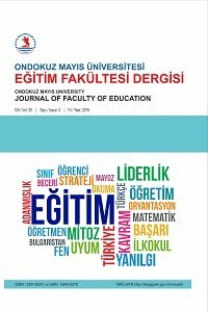LİSE ÖĞRENCİLERİNİN SU OKURYAZARLIK DÜZEYLERİNİN TESPİT EDİLMESİ: İSTANBUL İLİ ÖRNEĞİ
Temel besin ve hayat kaynağımız olan suyun önemli son yıllarda daha da artmış durumdadır. Bu durumun nedenlerinden bir tanesi sanayi devrimi sonrasında hızla artan dünya nüfusu nedeniyle kişi başına düşen tatlı su miktarının azalmasıdır. Ayrıca sanayileşmenin getirdiği su kirliliği, küresel iklim değişikliği, insanların suya karşı bilinç durumları da başlıca nedenler arasında yer almaktadır. Türkiye de dünya genelinde su azlığı ya da su stresi içerisinde yer alan bir ülke konumundadır. Bu su stresi Türkiye’nin en fazla nüfusuna sahip olan İstanbul ilinde daha da fazla yaşanmaktadır. Mevcut sıkıntıların yanında geleceğe yönelik olası sıkıntılarla baş etmenin temel yolu özellikle genç nüfusun su okuryazarlık düzeylerini tespit ederek planlamalar yapmaktır. Bu bağlamda araştırmada İstanbul’da öğrenim gören lise öğrencilerinin su okuryazarlık düzeylerini tespit etmektir. Anlık betimsel tarama modeli yöntemi le gerçekleştirilen bu araştırmada araştırmaya dahil edilecek lise öğrencileri kolay ulaşılabilir örneklem yöntemi ile seçilmiştir. 1965 lise öğrencisi ile elde edilen veriler SPSS 20 ile analiz edilmiştir. Analiz sonucunda lise öğrencilerinin orta düzeyde su okuryazarı oldukları sonucuna ulaşılmıştır. Su okuryazarlığının alt boyutları açısından ise su bilinci ve su duyarlılığında orta, su tasarrufunda yüksek düzeye sahip oldukları görülmüştür. Ayrıca lise öğrencilerinin su okuryazarlık düzeyleri üzerinde cinsiyet, okul türü, sınıf düzeyi, anne-baba eğitim durumu, aile gelir durumu gibi değişkenlerin etkili olduğu tespit edilmiştir. Çıkan sonuçlar ışığında İstanbul ili özelinde sürdürülebilir bir su okuryazarlığının önemi vurgulanarak birtakım önerilerde bulunulmuştur.
Anahtar Kelimeler:
su okuryazarlığı, istanbul, lise öğrencileri
Determining the Water Literacy Levels of High School Students: The Case of Istanbul
ABSTRACT
The importance of water, which is our basic food and life source, has increased even more in recent years. One of the reasons for this situation is the decrease in the amount of fresh water per capita due to the rapidly increasing world population after the industrial revolution. In addition, water pollution brought about by industrialization, global climate change, and people's awareness of water are among the main reasons. Turkey is a country that has water scarcity or water stress. This water stress is experienced even more in the province of Istanbul, which has the largest population in Turkey. In addition to the current problems, the main way to deal with possible problems for the future is to make plans by determining the water literacy levels of the young population. In this context, this research aims to determine the water literacy levels of high school students studying in Istanbul. This study, which was carried out with the instant descriptive survey method, used the easily accessible sampling method to select high school students for inclusion in the research. The data obtained with 1965 high school students was analyzed with SPSS 20. The analysis concluded that high school students are moderately water literate. In terms of sub-dimensions of water literacy, they had a moderate level of water awareness and water sensitivity, and a high level of water saving. In addition, variables such as gender, school type, grade level, parental education level, family income status had an effect on students’ water literacy levels. In the light of the results, some suggestions are made, emphasizing the importance of sustainable water literacy in the province of Istanbul.
Keywords:
water literacy, istanbul, high school students,
___
- Forbes, C. T., Brozović, N., Franz, T. E., Lally, D. E., & Petitt, D. N. (2018). Water in Society: An interdisciplinary course to support undergraduate students’ water literacy. Journal of College Science Teaching, 48(1), 36-42.
- Karasar, N. (2012). Bilimsel Araştırma Yöntemi. 23. Basım. Ankara: Nobel.
- LaDue, N. D., Ackerman, J. R., Blaum, D., & Shipley, T. F. (2021). Assessing Water Literacy: Undergraduate Student Conceptions of Groundwater and Surface Water Flow. Water, 13(5), 622.
- Maniam, G., Poh, P. E., Htar, T. T., Poon, W. C., & Chuah, L. H. (2021). Water Literacy in the Southeast Asian Context: Are We There Yet?. Water, 13(16), 2311.
- McCarroll, M., & Hamann, H. (2020). What We Know about Water: A Water Literacy Review. Water, 12(10), 2803. Moreno-Guerrero, A. J., Romero-Rodriguez, J. M., Lopez-Belmonte, J., & Alonso-Garcia, S. (2020). Flipped learning approach as educational innovation in water literacy. Water, 12(2), 574.
- Patton, M. (1990). Qualitative evaluation and research methods. Beverly Hills, CA: Sage.
- Sammel, A. J., & McMartin, D. W. (2014). Teaching and Knowing beyond the Water Cycle: What Does It Mean to Be Water Literate? Creative Education, 5, 835-848. http://dx.doi.org/10.4236/ce.2014.510097
- Sözcü, U. & Türker, A. (2020a). Su okuryazarlığı ölçeğinin geliştirilmesi, Üçüncü Sektör Sosyal Ekonomi Dergisi, 55(2), 1155-1168.
- Sözcü, U., & Türker, A. (2020b). Examining the Water Literacy Levels of High School Students According to Some Variables. Asian Journal of Education and Training, 6(3), 569-582.
- Tekin, H. (1996). Eğitimde Ölçme ve Değerlendirme. 9. Baskı, Ankara: Yargı Yayınları.
- Ursavaş, N. (2020). Su okuryazarlığının geliştirilmesinde bir kaynak olarak projectwet etkinliklerinin değerlendirilmesi. Türk Hijyen ve Deneysel Biyoloji Dergisi (EK4: Su ve Sağlık): 219-232.
- Ursavaş, N., & Aytar, A. (2018). Okul öncesi öğrencilerinin su farkındalığı ve su okuryazarlıklarındaki gelişimin incelenmesi: Proje tabanlı bir araştırma. İnformal Ortamlarda Araştırmalar Dergisi, 3(1), 19-45.
- Yıldırım, A. ve Şimşek, H. (2013). Nitel Araştırma Yöntemleri. 9. Genişletilmiş Baskı. Ankara: Seçkin.
- Yu, J. H., Lin, H. H., Lo, Y. C., Tseng, K. C., & Hsu, C. H. (2021). Measures to Cope with the Impact of Climate Change and Drought in the Island Region: A Study of the Water Literacy Awareness, Attitude, and Behavior of the Taiwanese Public. Water, 13(13), 1799.
- ISSN: 1300-302X
- Yayın Aralığı: Yılda 2 Sayı
- Başlangıç: 1986
- Yayıncı: Ondokuz Mayıs Üniversitesi Eğitim Fakültesi
Sayıdaki Diğer Makaleler
Yabancılara Türkçe Öğretiminde Ad Durum Ekleri ve Ad Eylemlerin Öğretimi
Vildan ÖNCÜL, Sinem GÖNEN KAYACAN
LGS’de Dil Bilgisi Sorularının Gerekliliği Üzerine Öğretmen Görüşleri
LİSE ÖĞRENCİLERİNİN SU OKURYAZARLIK DÜZEYLERİNİN TESPİT EDİLMESİ: İSTANBUL İLİ ÖRNEĞİ
Murat Mücahit YENTÜR, Ufuk SÖZCÜ, Duran AYDINÖZÜ
Zeynep ÇAKMAK GÜREL, Meryem ÖZTURAN SAĞIRLI
Yabancı Dil Öğretmenlerinin Otantik Materyal Kullanım Ölçeğinin Geliştirilmesi
Elif ÇABUK, Deren Başak AKMAN YEŞİLEL
Hacer DİNER EVREN, Alpaslan KARABULUT
E-Şikayet Sitelerindeki Okul Öncesi Eğitim Kurumları: “Şikayetim Var!”
Öğrenci Gözünden Uzaktan Matematik Öğrenimi: Sentiment Analizi
